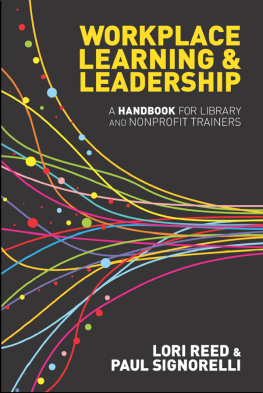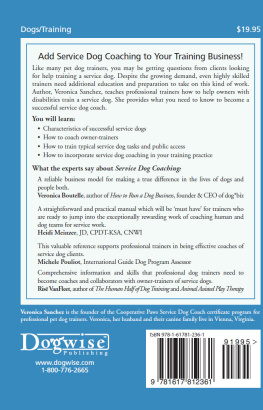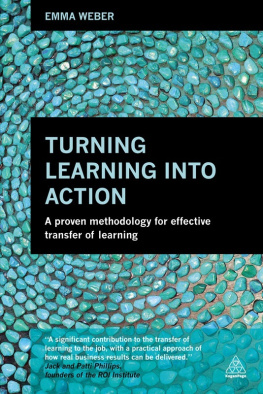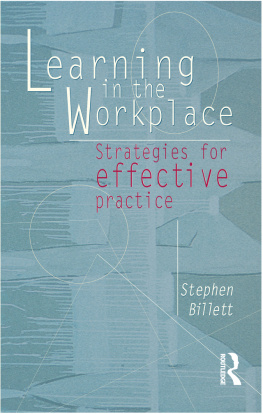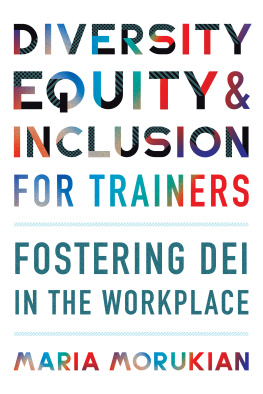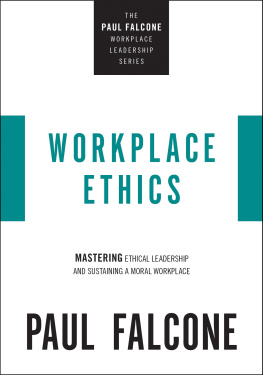Workplace Learning & Leadership
ALA Editions purchases fund advocacy, awareness, and accreditation programs for library professionals worldwide.
Workplace Learning & Leadership
A Handbook for Library and Nonprofit Trainers
Lori Reed
and
Paul Signorelli
American Library Association
Chicago 2011
Lori Reed is the learning and development coordinator for the Charlotte Mecklenburg Library, where she plans and oversees the learning and development of a diverse group of staff at twenty libraries. With more than fifteen years of experience in the workplace learning and development field, Lori is a North Carolina Master Trainer, a certified Synchronous Learning Expert, and was named a 2009 Library Journal Mover and Shaker.
Paul Signorelli is a San Franciscobased writer, trainer, presenter, and consultant who has held a variety of leadership positions. He served as director, Volunteer Services and Staff Training, for the San Francisco Public Library system; is active in the American Society for Training and Development and the American Library Association; and writes for a variety of online and print publications. He can be reached at paul@paulsignorelli.com.
2011 by the American Library Association. Any claim of copyright is subject to applicable limitations and exceptions, such as rights of fair use and library copying pursuant to Sections 107 and 108 of the U.S. Copyright Act. No copyright is claimed in content that is in the public domain, such as works of the U.S. government.
While extensive effort has gone into ensuring the reliability of the information in this book, the publisher makes no warranty, express or implied, with respect to the material contained herein.
ISBNs: 978-0-8389-1082-5 (paper); 978-0-8389-9290-6 (PDF); 978-0-8389-9291-3 (ePub); 978-0-8389-9292-0 (Mobipocket); 978-0-8389-9293-7 (Kindle). For more information on digital formats, visit the ALA Store at alastore.ala.org and select eEditions.
Cover design by Casey Bayer.
Library of Congress Cataloging-in-Publication Data
Reed, Lori, 1972
Workplace learning and leadership : a handbook for library and nonprofit trainers / Lori Reed, Paul Signorelli.
p. cm.
Includes bibliographical references and index.
ISBN 978-0-8389-1082-5 (alk. paper)
1. Library employeesIn-service trainingUnited States. 2. LibrariansIn-service trainingUnited States. 3. Nonprofit organizationsEmployeesIn-service training United States. 4. Employee training personnel. 5. Career development. 6. Organizational learning.
I. Signorelli, Paul. II. Title.
Z668.5.R44 2011
020.71'55dc22 2011011670
To
Peter Bromberg, Kimberly Bolan Cullin,
and Janie Hermann,
who opened doors;
Christopher Rhodes,
who sustained us with encouragement;
and
Pat Carterette and Robert Zimmerman,
who left before they had a chance
to read this
Contents
On behalf of the authors Lori Reed and Paul Signorelli, thank you for picking up this copy of Workplace Learning and Leadership. So, why should you add this book to your professional or personal collection?
Well, I have been fortunate to know both of the authors professionally and personally and I am very excited about this book you have in your hand. I am and you will be similarly impressed with the variety and knowledge they were able to extract from a broad array of library learning leaders. Thanks in no small part to Lori and Pauls interviewing skills, these leaders readily shared valuable and practical skills and techniques that have worked and not worked for them in their organizations training environment.
This book is written from the perspective of the training professional working primarily in public libraries within the United States; however, the knowledge that fills these pages will help anyone who is involved in training, coaching, mentoring, or encouraging staff and the public in any type of organization in any locale. The insights and skills discussed in the book are also readily applicable in any particular employment or training situation.
Are you a new or aspiring trainer and want to know some secrets of successful trainers? Well, you are in luck since many successful trainers were interviewed for this book and provide practical skills and insights from their personal training experience to help someone new to the world of training and learning opportunity development.
Are you the person who directly or indirectly supervises a trainer and would like to know how to support your trainers work within the framework of a successful organization? You can see how other trainers use post learning opportunity evaluation and continual organizational backing to support the learning objectives during the formal training session, reinforce the skills after the session, and have their training/learning staff heavily involved in organizational decision making processes.
Are you a working trainer in need of some assistance with evaluation? Do you need assistance with learner support? Do you want some pointers on how to make organizational learning a key player at your organizations planning table? Each of these issues is covered in a concise, clearly written chapter brimming with how we did what we did tips, suggestions, and a cautionary tale or two.
Like all good trainers, Lori and Paul have written this book so that it is adaptable to your use and needs. This book would be equally effective used as individual chapters for personal or professional exploration or as an entire book devoured in one or two readings covering the entire subject of Workplace Learning and Leadership.
The , In the Beginning, will be of interest to both new and not so new trainers and administrators. It is filled with descriptions of how the professionals interviewed in the book fell into training, highlighting that there is no one path to becoming a trainer. Since it is rare for a school to offer a trainer track of coursework, trainers come from innumerable fields and accidentally discover their natural gift to convey valuable information effectively and efficiently.
and focuses on two issues relevant to any trainer. The chapters first focus is all about creating your own personal learning space in order to collaborate with fellow trainers as a proven method for improving your skill set. The second focus is on developing your organizations community of learning to support your learning opportunities.
, Trainers as Internal Consultants and Facilitators of Change, discusses the trainers role in organizational development and problem solving. Trainers have too often overlooked skills to offer their organization. First is the skill to quickly identify effective training for both individuals and organizational groups. The second skill, equally as critical to organizational success and health, is to quickly diagnose whether a personnel problem is a training issue or an issue better resolved via mentoring, formal discipline, or other human resources management methods.
, Preparing to Deliver: From Initial Idea to Moment of Delivery, discusses the full gamut of learning opportunity session planning. This cycle starts with the initial development of learning objectives, to the session planning and promotion, Adult Learning Theory, and session delivery. It concludes with post learning opportunity evaluation. This chapter would be most beneficial to the new trainer looking for specific best practices of successful trainers for developing effective and appropriate learning opportunities.
s themes by focusing on techniques that work for successful learning opportunity delivery that both supports your initial learning objectives and resonates with your trainees. Methods include the use of intense preparation, humor, and flexibility to ensure you have delivered a successful and memorable (for the right reasons) learning opportunity.
Next page
